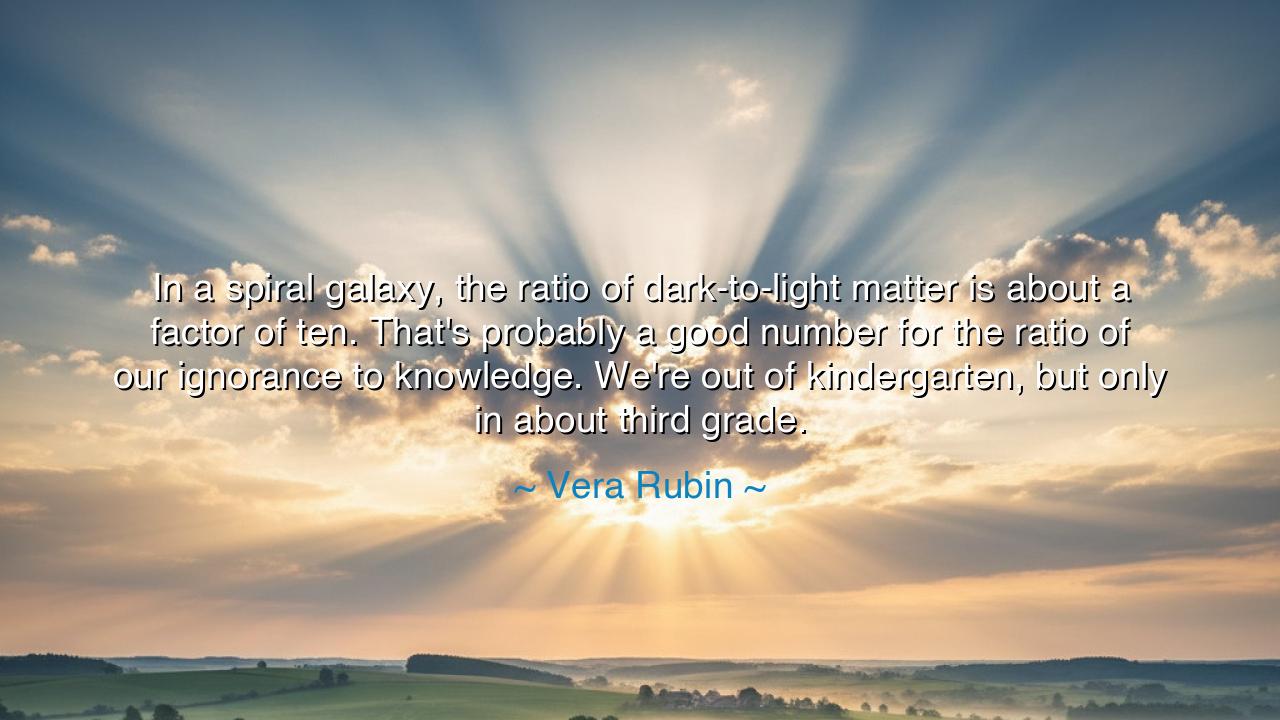
In a spiral galaxy, the ratio of dark-to-light matter is about a
In a spiral galaxy, the ratio of dark-to-light matter is about a factor of ten. That's probably a good number for the ratio of our ignorance to knowledge. We're out of kindergarten, but only in about third grade.






The words of Vera Rubin, “In a spiral galaxy, the ratio of dark-to-light matter is about a factor of ten. That's probably a good number for the ratio of our ignorance to knowledge. We're out of kindergarten, but only in about third grade,” are the musings of a scientist who gazed into the vastness of the cosmos and saw reflected there the humility of the human mind. Beneath the precision of her observation lies a truth as old as philosophy itself — that for every truth we uncover, there are ten yet hidden in the darkness. Her words are both poetic and sobering: a reminder that knowledge, no matter how bright, floats in an ocean of mystery, and that wisdom begins not in pride, but in wonder.
Vera Rubin, the astronomer who proved the existence of dark matter, spoke these words not as a philosopher removed from the stars, but as one who had wrestled with their silence. Her discovery, born from studying the rotation of galaxies, revealed that the universe is not what it appears. The light of stars — the visible, the measurable — is but a small portion of reality. The rest, the vast majority, lies unseen, shaping the cosmos in silence. And so, when she compared the dark-to-light matter ratio to our own understanding, she was not exaggerating. She was confessing a truth she had learned firsthand: that human knowledge, for all its brilliance, is still young, still fumbling, still surrounded by the immensity of the unknown.
In her words, we find the ancient humility of Socrates, who said, “The only true wisdom is in knowing you know nothing.” Rubin, centuries later, echoed this in the language of the stars. She recognized that every discovery, no matter how great, only deepens the mystery — that the more we illuminate, the more shadows we see. The “third grade” of which she speaks is not an insult to humanity, but an invitation — a call to keep learning, to never mistake progress for completion. For even as we measure the heavens, we remain children gazing upward, still learning the grammar of creation.
To illustrate her point, one need only recall the story of the scientific revolutions that transformed our understanding of the world. There was a time when humanity believed the Earth was the center of the universe. Then came Copernicus, who dared to move the sun to its rightful place. After him, Newton revealed the laws of motion, and the world marveled. Yet centuries later, Einstein came and shattered those certainties, showing that time and space themselves could bend and twist. Each generation thought it stood on solid ground, yet beneath its feet the foundations always shifted. Rubin understood this pattern deeply: that knowledge does not end — it evolves, layer upon layer, always revealing new depths of our ignorance.
Her ratio of ten to one is not a statement of despair, but of awe. It reminds us that ignorance is not failure; it is fuel. The vast darkness of what we do not know is what gives meaning to the light we have. Without mystery, there would be no curiosity; without the unknown, no discovery. Rubin’s words transform ignorance from a flaw into a frontier. Just as galaxies are held together by invisible forces, so too is human progress bound together by the gravity of what remains undiscovered. We are driven forward by the pull of that unseen truth.
In the style of the ancients, her insight might be called the path of humility — the way of the seeker who walks knowing that knowledge is endless. The wise do not boast of their understanding; they marvel at its smallness. For just as a child who learns to read has only begun to touch the world of words, so too have we, in the great library of the cosmos, barely opened the first few pages. To be “in third grade,” as Rubin says, is no insult — it is a promise that growth is still possible, that the story of discovery is far from over.
Let this be the lesson her words leave to future generations: revere mystery, pursue truth, and remain humble before both. In every field — whether in science, art, or the inner life — remember that what you see is only the surface, and that beneath it lies an ocean waiting to be explored. Seek understanding not to conquer, but to connect — not to master the universe, but to join in its endless unfolding. The stars do not reveal all their secrets to the arrogant, but to the patient, the reverent, the curious.
And so, in the spirit of Vera Rubin, look to the heavens and remember: our knowledge is a lantern, flickering in a sea of darkness, and our ignorance, vast and deep, is not our shame but our destiny — for it calls us forward, forever learning, forever seeking, forever reaching toward the light.






AAdministratorAdministrator
Welcome, honored guests. Please leave a comment, we will respond soon